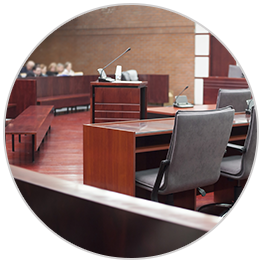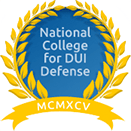Table of Contents
A person who receives a citation or is arrested in Passaic County will usually have their day in court in the municipal court for the city, town or township where they were arrested. Municipal courts are courts of limited jurisdiction that handle cases that occur within the boundaries of their municipalities.
Municipal courts in New Jersey are responsible for resolving municipal ordinance violations such as barking dogs, building code violations, traffic offenses and parking tickets, as well as minor criminal charges such as bad checks, shoplifting and fish and game violations. Serious criminal offenses such as assault, robbery, or auto theft often start as complaints filed in municipal court and are then transferred to the Superior Court.
The importance of an appearance in Municipal Court should not be underestimated. You will want to be sure that you have an experienced defense lawyer representing you. Even some minor offenses can carry serious penalties including fines of as much as $1,000 and jail sentences of up to six months. A conviction in Municipal Court will appear on your criminal record and could create issues any time you apply for employment, housing, public benefits, college admission or professional licensing.
The attorneys at the Law Offices of Jonathan F. Marshall have decades of experience handling cases in Municipal Court. Our legal team includes former prosecutors and public defenders, which means that we have an insider’s understanding of how the prosecution will handle your case. That knowledge allows us to represent you more effectively.
Have you or your loved one recently been arrested or ticketed in Paterson, Passaic, Bloomingdale, Clifton, Little Falls, Wayne, or West Milford? If you’ve received a citation or a summons and been ordered to appear in Municipal Court, make sure you seek the guidance of an experienced attorney at the Law Offices of Jonathan F. Marshall. We have nine offices in New Jersey and can be contacted anytime, including nights and weekends, to help you.
What Is a New Jersey Municipal Court?
Many New Jersey residents are introduced to the judicial system through municipal court. People may enter the municipal court as a defendant, a victim, or possibly a witness.
Serious criminal offenses are known as indictable offenses and are usually transferred from the municipal court to the county prosecutor’s office. A county prosecutor may present the case to a Grand Jury, which may lead to an indictment, which is a criminal charge that will be heard in the New Jersey Superior Court system. The county prosecutor could also return the crime to a municipal court as a less severe offense.
The four general categories of cases heard in municipal court are:
- Violations of New Jersey Division of Fish and Wildlife regulations, Division of Parks and Forestry regulations, Office of Weights and Measures regulations, boating regulations, or animal cruelty (Society for the Prevention of Cruelty to Animals [SPCA]) regulations
- Motor vehicle and traffic law violations
- Municipal ordinance violations
- Disorderly and petty disorderly persons offenses
People usually are required to appear in a municipal court when they are charged with a crime such as simple drug possession, shoplifting, or assault. For a non-criminal violation, a court appearance may be optional.
You are allowed to pay a fine without a court appearance if there is no check in the “Court Appearance Required” box on your complaint or if either the Statewide Violations Bureau Schedule or the Local Violations Bureau Schedule has your charge listed. When the “Court Appearance Required” is checked, you will have to appear in court as required, regardless of your intended plea.
Even when a court appearance is not required, you will still need to appear in court if you do not want to plead guilty and pay a fine and you wish to contest a charge. Our attorneys can review the details of your case and discuss your legal options and the steps to resolve the charges.
What Cases Are Heard in N.J. Municipal Courts?
The Sixth Amendment to the United States Constitution provides that an accused person enjoys the right to a speedy trial and to be informed of the nature and cause of the accusation. A defendant also has a Constitutional right to the assistance of legal counsel.
The Law Offices of Jonathan F. Marshall regularly handles municipal court appearances to protect the rights of people in West Milford, Paterson, Wayne, Passaic, Little Falls, Clifton, and Bloomingdale. Our firm will stand up for your rights and seek to get your charges reduced or dismissed.
We are committed to helping you resolve your case with the least possible consequences to your future. The Law Offices of Jonathan F. Marshall handles:
- Preliminary Proceedings in Felonies / Indictable Offenses
- Traffic Tickets
- Small Claims Cases
- Misdemeanor Offenses / Disorderly Persons Offenses
- City Ordinance Violations
- Disorderly Conduct Charges
- Use of Fake IDs
- Providing Alcohol to Minors
- Domestic Violence Cases
Your initial consultation with the Law Offices of Jonathan F. Marshall is free and without obligation. A consultation should give you a better understanding of your options at no cost. We will certainly let you know when a guilty plea may be in your best interest. But our goal typically is to resolve the charges in a way to minimize their impact on your future.
What Happens in a New Jersey Municipal Court?
The Municipal Court will usually begin with the presiding judge reading an opening statement explaining the court procedures and rights of defendants. The cases are called and will be processed in an order such that requests for postponements will be handled first, and then uncontested motions, first arraignments, and guilty pleas.
Contested motions would come next, followed by not guilty pleas with an attorney, and finally not guilty pleas without an attorney.
When a case is called, the judge will advise an alleged offender of his or her rights. The defendant will have three choices:
- Ask for a postponement. A judge can reschedule a court date when you need additional time to get legal representation. If you want to have your case postponed, you should speak to court staff before the judge begins the court session. A prosecutor or staff member could ask for people seeking postponements to come forward before the judge enters the courtroom to deal with them right away.
- Plead guilty. When you plead guilty, the judge will ask you questions about the alleged offense to ensure there is a basis for the plea and that your plea is voluntary. The judge then makes a finding and imposes a sentence. Remember that you can always change a not guilty plea to a guilty plea later, but the opposite is never as simple. Withdrawing a guilty plea can be difficult, so you must be certain that you know you want to plead guilty to any offense.
- Plead not guilty. When you plead not guilty, a judge then presides over a trial that could be held the same day or on another day in the future. Remember that you are entitled to a presumption of innocence when facing criminal charges. The burden is on the state to prove your guilt beyond a reasonable doubt.
If your trial is held in Municipal Court, it will be a “bench trial,” meaning that only the judge will hear and decide the case.
At trial, the prosecutor will present the case first and call witnesses to answer questions designed to prove a defendant’s guilt. The defense lawyer is then allowed to cross-examine each witness.
A defense attorney also may call witnesses. You could be asked to testify but are not required to do so. Your testimony could prove to be advantageous, but it also involves risks. If you testify, then the prosecutor will be allowed to ask you questions during cross examination. Your attorney will help you decide whether it is in your interest to testify.
After both sides have presented all of their witnesses and evidence, the judge will render a decision. If the judge finds you guilty, the judge can impose a sentence that may include fines and court costs, probation, driver’s license suspension, and/or community service.
If a Municipal Court judge imposes a jail sentence, it will not be more than six months. Criminal charges with potentially longer sentences are heard in Superior Court. A municipal court sentence will be served at the County Jail or the County’s Juvenile Detention Facility, possibly served on weekends and work release coordinated through the Jail’s Work Release Administrator.
Mediation and Appealing a N.J. Municipal Court Decision
You could be required to settle your dispute in a case involving harm to another person through mediation instead of going before a judge. Mediation can be requested, and the court determines eligibility.
When your municipal case court goes to a trial, and you disagree with the judge’s decision, you have the right to an appeal. The superior court will hear your appeal, but it is not a new trial. The superior court will review the transcript of your case as well as the judge’s decision, limiting reversals of municipal court decisions to mistakes of fact or misapplication of the law.
You only have 20 days from the date of a municipal court decision to file an appeal. You can request to have a penalty set aside pending the outcome of an appeal. A judge will decide whether to allow this.
Rule for Suppression Motions in Municipal Court
Under New Jersey Municipal Court Rule § 7:5-2(a), a municipal court can entertain motions to suppress evidence seized without a warrant in matters within its trial jurisdiction on notice to the prosecuting attorney and the county prosecutor if they are not the prosecuting attorney. When a motion to suppress evidence is in matters beyond the trial jurisdiction of the municipal court, the motion must be made and heard in the Superior Court.
New Jersey Municipal Court Rule § 7:5-2(b) provides that all motions to suppress shall be heard before the start of the trial. Under New Jersey Municipal Court Rule § 7:5-2(c)(1), an order granting a motion to suppress evidence must be entered immediately upon the decision on the motion and the municipal court administrator must provide a copy of the order to all parties within 10 days. Property subject to a suppression order will be returned to the person entitled to it if the State has exhausted its right to appeal.
New Jersey Municipal Court Rule § 7:5-2(c)(2) establishes that an order denying suppression can be reviewed on appeal from an ensuing judgment of conviction. Under New Jersey Municipal Court Rule § 7:5-2(d), a defendant’s failure to make a pretrial motion to the municipal court pursuant to this rule will constitute a waiver of any objection during trial to the admission of the evidence on the grounds that the evidence was unlawfully obtained.
Do Not Face a N.J. Municipal Court on Your Own
You do not want to take any chances with a Municipal Court appearance. Even when an appearance is not required, paying a fine is the same as pleading guilty and there could be long-term consequences to doing so. Instead of responding to a citation on your own or representing yourself in court, contact The Law Offices of Jonathan F. Marshall for help. Our experienced New Jersey criminal defense attorneys will help you understand your rights and legal options, and we will assist with your case.


 What Is a New Jersey Municipal Court?
What Is a New Jersey Municipal Court? 






